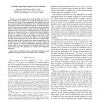Free Online Productivity Tools
i2Speak
i2Symbol
i2OCR
iTex2Img
iWeb2Print
iWeb2Shot
i2Type
iPdf2Split
iPdf2Merge
i2Bopomofo
i2Arabic
i2Style
i2Image
i2PDF
iLatex2Rtf
Sci2ools
120
click to vote
TNN
2011
2011
Extended Input Space Support Vector Machine
—In some applications, the probability of error of a given classifier is too high for its practical application, but we are allowed to gather more independent test samples from the same class to reduce the probability of error of the final decision. From the point of view of hypothesis testing, the solution is given by the Neyman–Pearson lemma. However, there is no equivalent result to the Neyman–Pearson lemma when the likelihoods are unknown, and we are given a training dataset. In this brief, we explore two alternatives. First, we combine the soft (probabilistic) outputs of a given classifier to produce a consensus labeling for K test samples. In the second approach, we build a new classifier that directly computes the label for K test samples. For this second approach, we need to define an extended input space training set and incorporate the known symmetries in the classifier. This latter approach gives more accurate results, as it only requires an accurate classificat...
Related Content
| Added | 15 May 2011 |
| Updated | 15 May 2011 |
| Type | Journal |
| Year | 2011 |
| Where | TNN |
| Authors | Ricardo Santiago-Mozos, Fernando Pérez-Cruz, Antonio Artés-Rodríguez |
Comments (0)

